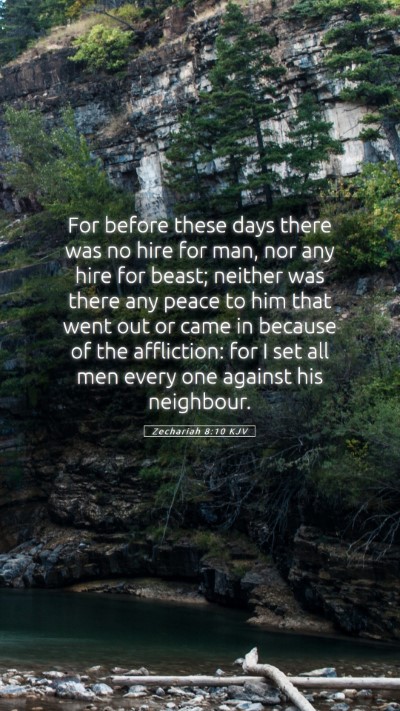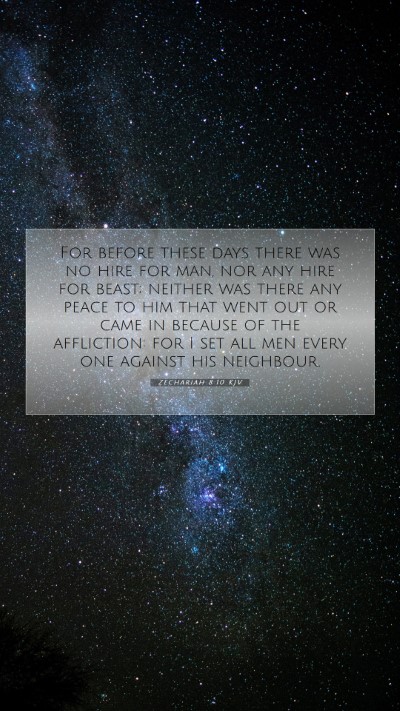Understanding Zechariah 8:10 - A Comprehensive Bible Verse Commentary
In the analysis of Zechariah 8:10, we delve into the nuances of this scripture to gain a deeper understanding of its message. This passage is often explored for its relevance in both historical and contemporary contexts.
Text of Zechariah 8:10
"For before those days, there was no hire for man, nor any hire for beast; neither was there any peace to him that went out or came in because of the affliction: for I set all men every one against his neighbor." (Zechariah 8:10)
Bible Verse Meanings
The essence of this verse reflects a time of desolation and strife prior to the promised restoration. Commentators like Matthew Henry highlight the conditions of societal unrest that defined the period before God’s promising change.
Historical Context
In examining the historical context of Zechariah 8:10, it is essential to recognize that this verse was spoken during a time when the Jewish people faced extreme hardship. Post-exilic Jerusalem was characterized by poverty and a lack of unity. The choice of words reflects a grim reality where both man and beast suffered from economic disarray.
Bible Verse Interpretations
Interpretatively, this verse serves as a pivotal point wherein the prophet Zechariah conveys a shift from despair to hope. Albert Barnes suggests that the lack of prosperity described symbolizes a deeper spiritual malaise affecting the community. This commentary offers insight into the emotional and psychological impact of living in such despair.
The Role of Divine Intervention
This scripture positions divine intervention as crucial. The afflictions faced by the people are contrasted against God’s promises of peace and restoration that follow in subsequent verses. Adam Clarke's commentary emphasizes that God's future blessing would rectify past injustices, encouraging believers to hold fast in their faith during difficult seasons.
Bible Study Insights
- Meaning of Bible Verses: The translation of this verse invites readers to reflect on the nature of hardship and community challenges.
- Understanding Scripture: It promotes consideration of God's justice and mercy towards His people, implying a promise of renewal.
- Biblical Exegesis: Critical analysis shows the juxtaposition of sorrow with the abundant life promised by God in the future.
Application of Zechariah 8:10
This verse is especially pertinent for individuals and Bible study groups seeking to understand how to apply ancient texts to modern life. It encourages believers to find solace in the fact that seasons of hardship can lead to divine restoration.
Instructions for Present-day Application
- Reflect on instances of hardship in your life and recognize God’s promises amidst them.
- Engage in community support to foster resilience, mirroring the communal healing Zechariah speaks of.
- Utilize Bible study tools and resources to delve into further study of related passages and enhance your understanding of scripture.
Cross References
To enrich the understanding of Zechariah 8:10, consider these related verses:
- Isaiah 65:21-22 - God's promise for a peaceful community.
- Haggai 2:19 - Assurance of God's blessing after hardship.
- Jeremiah 29:11 - God's plans for prosperity and hope.
Conclusion
In summary, the insight provided by the commentaries of Matthew Henry, Albert Barnes, and Adam Clarke allows for a rich understanding of Zechariah 8:10. This verse, steeped in the history of the Jewish people’s struggles, articulates a profound message of hope and divine restoration which resonates with believers today. For anyone in Bible study groups or engaging in online Bible study, this passage serves as a poignant reminder of God's unwavering presence in our lives.


